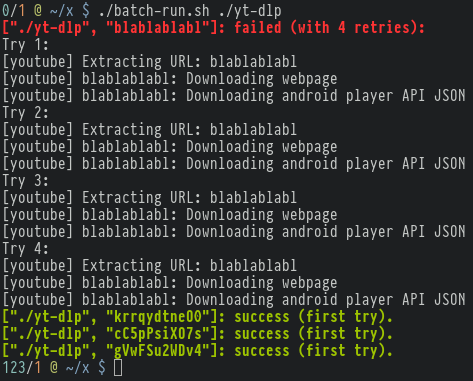Parallelize batch runs with style
Problem statement
In Parallelize YouTube downloads
I introduced my favorite trick for parallel execution with xargs.
And while seq 1 50 | xargs -P25 -I{} echo {} is definitely
a worthy pattern1, the intermixed output and no clear indication
of status is a bummer.
So given input file ids:
$ cat ids
cC5pPsiXO7s
gVwFSu2WDv4
krrqydtneO0
blablablabl
I’d like to get to something as nice as this:

In other words, a command runner that:
- shows clear success/failure status for a batch job
- retries on failures (a few times)
- on success doesn’t output stdout/stderr, just state
- on final failure outputs error state and stdout/stderr (for debugging)
And as an optional extra:
- Allows specifying “verbose” flag for more verbosity.
Solution
How was I gonna do it? Ruby, naturally2.
The batch-run.sh itself is something rather straightforward; it actually
doesn’t have to be a script:
$ xargs -I{} -P25 ./upto-n-times.rb 4 echo {} < ids
The passing of “verbose” flag can be env variable, for simplicity.
So either export VERBOSE=1 or downright:
$ seq 1 1 | VERBOSE=1 xargs -I{} -P25 ./upto-n-times.rb 4 echo {}
["echo", "1"]: running (1 try)...
["echo", "1"]: success (first try).
Try 1:
1
So obviously the main course is the upto-n-times.rb; in other words,
the runner with retry logic, nice reporting, etc.
My take on that (and a hardly surprising one, I’d say):
#!/usr/bin/env ruby
require 'open3'
# Runs given command, and on failures retries up to N times
if ARGV.size < 2
STDERR.puts "Usage: #{File.basename($0)} <retries> <command>+"
exit 111
end
num_retries = ARGV.first.to_i
if num_retries.zero?
STDERR.puts "num_retries (first argv) must be a number > 0"
exit 112
end
command = ARGV[1..-1]
output = []
status = nil
num_retries.times do |i|
puts "#{command.inspect}: running (#{i+1} try)..." if ENV['VERBOSE']
out, status = Open3.capture2e(*command)
output << out
break if status.success?
end
if status.success?
puts "\e[1;32m#{command.inspect}: success (" +
(output.size < 2 ? "first try" : "#{output.size} tries") + ").\e[0m"
else
puts "\e[1;31m#{command.inspect}: failed (with #{num_retries} retries):\e[0m"
end
if !status.success? || ENV['VERBOSE']
output.each_with_index do |o, i|
puts "Try #{i+1}:"
puts o
end
end
exit status.exitstatus
and maybe slightly polished batch-run.sh, that checks the input parameter
and passes on the $VERBOSE flag (if set):
#!/bin/bash
# Runs a given shell script for all of `ids`.
# (25 at a time, with 4 retries on failure)
if [ $# -ne 1 -o ! -x "$1" ]; then
echo "Usage: $0 <script>" >&2
exit 1
fi
# if VERBOSE is set, propagate
if [ ! -z "${VERBOSE+x}" ]; then
export VERBOSE=1
fi
exec xargs -I{} -P25 ./upto-n-times.rb 4 "$1" {} < ids
Demo time
In the end, this works rather well. For a script that intermittently fails:
#!/usr/bin/env ruby
i = ARGV.first.to_i
if i.odd?
if (rand(10)%3).zero?
puts "even, ok"
exit 0
else
puts "even, fail"
exit 1
end
else
puts "even, ok"
exit 0
end
the retry logic works as it should:
$ seq 1 10 > ids
$ ./batch-run.sh ./fail-on-odd.rb
["./fail-on-odd.rb", "2"]: success (first try).
["./fail-on-odd.rb", "4"]: success (first try).
["./fail-on-odd.rb", "8"]: success (first try).
["./fail-on-odd.rb", "6"]: success (first try).
["./fail-on-odd.rb", "9"]: success (first try).
["./fail-on-odd.rb", "10"]: success (first try).
["./fail-on-odd.rb", "7"]: success (3 tries).
["./fail-on-odd.rb", "1"]: success (4 tries).
["./fail-on-odd.rb", "5"]: failed (with 4 retries):
Try 1:
even, fail
Try 2:
even, fail
Try 3:
even, fail
Try 4:
even, fail
["./fail-on-odd.rb", "3"]: success (4 tries).
and verbose output also3:
$ seq 1 5 > ids
$ VERBOSE=1 ./batch-run.sh ./fail-on-odd.rb
["./fail-on-odd.rb", "5"]: running (1 try)...
["./fail-on-odd.rb", "2"]: running (1 try)...
["./fail-on-odd.rb", "4"]: running (1 try)...
["./fail-on-odd.rb", "3"]: running (1 try)...
["./fail-on-odd.rb", "1"]: running (1 try)...
["./fail-on-odd.rb", "2"]: success (first try).
Try 1:
even, ok
["./fail-on-odd.rb", "4"]: success (first try).
Try 1:
even, ok
["./fail-on-odd.rb", "5"]: running (2 try)...
["./fail-on-odd.rb", "1"]: running (2 try)...
["./fail-on-odd.rb", "3"]: running (2 try)...
["./fail-on-odd.rb", "5"]: running (3 try)...
["./fail-on-odd.rb", "1"]: success (2 tries).
Try 1:
even, fail
Try 2:
even, ok
["./fail-on-odd.rb", "3"]: running (3 try)...
["./fail-on-odd.rb", "5"]: success (3 tries).
Try 1:
even, fail
Try 2:
even, fail
Try 3:
even, ok
["./fail-on-odd.rb", "3"]: running (4 try)...
["./fail-on-odd.rb", "3"]: failed (with 4 retries):
Try 1:
even, fail
Try 2:
even, fail
Try 3:
even, fail
Try 4:
even, fail
Closing words
This is a very simple thing4, but one that I like for the demonstration of composability on Unix.
Because often various “problems” can be solved by divide and conquer strategy – splitting the problems into manageable chunks and composing them back together.
What’s your favorite quickie, dear reader?
-
And yes, I’m aware of GNU parallel, in all its might and scary complexity. ↩
-
Yes, nowadays, surfing the up slope of AI hype you’d almost expect me to join the chorus of “prompt ChatGPT to write that for me”. This is not that kind of blog. ↩
-
You just need to imagine the nice red/green there. Because text>screenshot. ↩
-
Yup, the write-up took longer than the script. ↩